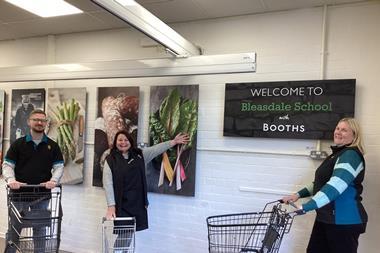Grocery Aid is keeping up the good work distributing store surpluses to the needy. Gillian Law visited three recipients to see just how the trade charity is making a difference
Britain throws away 500,000 tonnes of edible food a year. In a country with one of the highest child poverty figures in the industrialised world, the waste is a scandal, say charities.
In an attempt to redistribute at least some of the food before it is thrown out, charities collect what they can from supermarkets and manufacturers and deliver it to hostels and soup kitchens. There's only so much they can do when homelessness and poverty are major problems for society that need a bigger solution than leftover food. Nevertheless, any help is always welcome.
The grocery industry's own charity, originally known as Provision and rebranded last year as Grocery Aid, is run by IGD. It collects 2,000 tonnes of food a year from retailers and manufacturers and distributes it to almost 400 charities. Grocery Aid has distributed £15m of products from its five depots since it was started in 1993.
The Bristol depot is in the back corner of Safeway's warehouse at Cribbs Causeway. Safeway provides 1,500 sq ft of space to store goods, staff and forklifts to move products around, a temporary hut to run the distribution from, and the electricity for both the cabin and a giant freezer in the car park. Safeway won't say how much all this costs except that it's a "signicant investment" and "we're certainly doing our bit," as a spokeswoman pointed out.
Depot manager Doug Jones was a Somerfield supermarket manager under he was seconded to the charity role in 1993. He expected it to be a short-term placement but found he loved the challenge. All depot managers are seconded from supermarkets with their employers continuing to pay their salaries.
Each week Jones receives deliveries of ambient and dry goods mostly cereals, biscuits, crisps and household products from supermarkets and manufacturers in the area and distributes them to charities which have all been vetted for cleanliness and honesty.
All the products are in date', often by several months. Supermarkets demand a shelf life of at least nine months on delivered ambient products, says Jones, so anything shorter can be sent to him. Damaged cartons can also be useful: while Grocery Aid won't take the damaged product, it often ends up with the other 11 from a carton of 12, where one has been broken or bashed.
IGD is fussy about who the products go to they must be registered charities and are graded according to their cleanliness and food safety standards. Jones regularly drops in on charities to check products are being distributed as they should be. Grocery Aid won't contribute to food parcels, for example, because Jones says the products in them are too easily sold to raise money for drugs. Instead, the products must be prepared and served in the charity's own kitchens.
The Salvation Army runs the biggest homeless hostel in Bristol. Breakfast normally sees 80 people eating in the hostel mostly filling up on cereals from Grocery Aid while 45 to 50 people come for dinner.
Assistant manager Maria Galinou says the donations from Grocery Aid help the hostel particularly with the breakfast meals and frozen food mostly chips, fish pieces and burgers but she stresses that what the hostel really needs is fresh fruit, vegetables and bread. "We wouldn't turn anything down but the people we see need the nutrition. If we can get them to eat a bit of fruit, it's great." Ideally, she'd prefer fresh food before it's on the turn' but few suppliers will give food away while it can be sold. It's difficult, she says, to tell residents that they can't take a sandwich to their room because, although it's OK now, it will have gone off by tomorrow."
Fresh food distribution involves a very different supply chain, says IGD spokeswoman Jane Beard and one Grocery Aid has chosen not to get into. Charities collect produce from supermarkets just as it hits its due by date', store it overnight and then deliver it to soup kitchens and hostels who can use it.
The biggest fresh produce' redistribution charity is Crisis Fare Share with seven centres throughout the country. These are run as social franchises' so that there is local knowledge involved but with the Crisis name and backing behind them.
They can work alongside charities like Grocery Aid, says spokeswoman Karen Bradford, because they operate in different areas of the supply chain. Other smaller and ad hoc produce distribution schemes operate throughout the country, including arrangements between individual supermarkets and local charities.
"We have a good relationship with the fresh food charities," agrees Beard, "and of course the products we supply let the charities save money which they can then spend on really fresh food."
Across the road from the Salvation Army is Redwood House, a 40 bed hostel for young homeless people. The self catering hostel relies on food from Grocery Aid, which is distributed on a Friday night. There is a large communal kitchen where residents are given cookery lessons and encouraged to look after themselves.
Not that many do, says assistant manager Colin Creighton. "Most of the residents live chaotic lifestyles and so they don't eat here, or anywhere, on a regular basis. Many have addiction problems, so they spend no money on food. Most are malnourished with very low nutrition levels."
One aim of the hostel is to help young people into council accomodation. Waiting lists for single people in Bristol are years long, says Creighton, but the hostel runs a resettlement scheme and can fast-track residents into flats if they show they can live independently. There's seldom a vacancy in Redwood House for more than an hour, he says, because of the value of that fast-track service.
Across town, Doug visits another charity: the Little Sisters of the Poor retirement home. The chintzy, flowery decor makes the 17th century building look more like a hotel than a charitable organisation and the 40 residents are all well dressed.
Cereals, biscuits and lemonade from Grocery Aid help stock the cupboards. But isn't the home clearly well off, and in less need of the free food? Sister Stanislav, who runs the home, says it is funded by residents' pensions and street collections by the nuns.
The Grocery Aid rules can be harsh: when one charity was found to be sharing its donation with another of its branches, it was cut off because those premises hadn't been inspected and approved. If a charity chose to sell or swap the crisps and oven chips it received to get fresh fruit, again it would be dropped. These rules are necessary because of food safety laws but must be frustrating.
A recent report by Sustain, an alliance of food, environmental and other charities, questioned whether food redistribution just perpetuates the problem. Food charity has never solved the problem of food poverty, says Professor Tim Lang of the food policy centre at Thames Valley University. "It's a return to the medieval past, not a way forward for Britain." Food should be available and affordable for everyone through normal channels, says Sustain.
But are companies just using charity distribution as a way to salve their conscience and resolve their waste issues?
It's not the grocery industry's role to feed everyone who needs food, and the problem starts long before people turn up hungry at a hostel. But what is given should be useful and should be given in the right spirit. As Bradford says: "What matters is their driving motivation. Do they try to meet the need or do they just want to get rid of what they have?"
{{FEATURES }}
Close menu
- Home
- Retail & Wholesale
-
Products & Suppliers
- Back to parent navigation item
- Products & Suppliers
-
Product Categories:
- Back to parent navigation item
- Product Categories:
- Alcoholic drinks
- Bakery
- Cereals & breakfast
- Cheese
- Chicken & poultry
- Chocolate
- Confectionery
- Crisps, nuts & snacks
- Dairy
- Fish
- Fresh produce
- Frozen
- Household
- Meat
- Own Label
- Sauces & condiments
- Seasonal
- Soft drinks
- Vaping
- Vegan & plant-based
- World foods
- Suppliers
- People
- Reports & Data
-
Topics A-Z
- Back to parent navigation item
- Topics A-Z
-
Popular topics:
- Back to parent navigation item
- Popular topics:
- Cost of living crisis
- Crime
- Deposit Return Schemes
- Finance
- Government & Regulation
- Health
- Inflation
- Loyalty
- Marketing
- Mergers & Acquisitions
- New Product Development
- Sourcing
- Supply chain
- Sustainability & environment
- Technology
- Ultra Processed Foods
- Vaping
- A-Z all topics
- Content by type:
- Events
- Ask iA (beta)
- Subscribe now
Sign in to comment on this article
Not logged in before? Register for FREE guest access today.
You will be able to:
- Read more stories
- Receive daily newsletters
- Comment on stories
Advert
















No comments yet